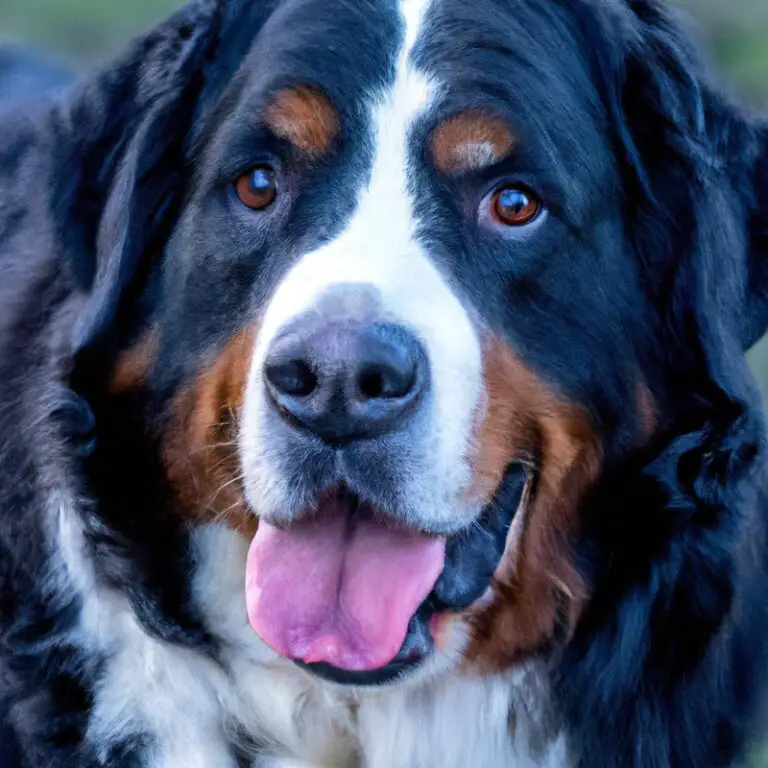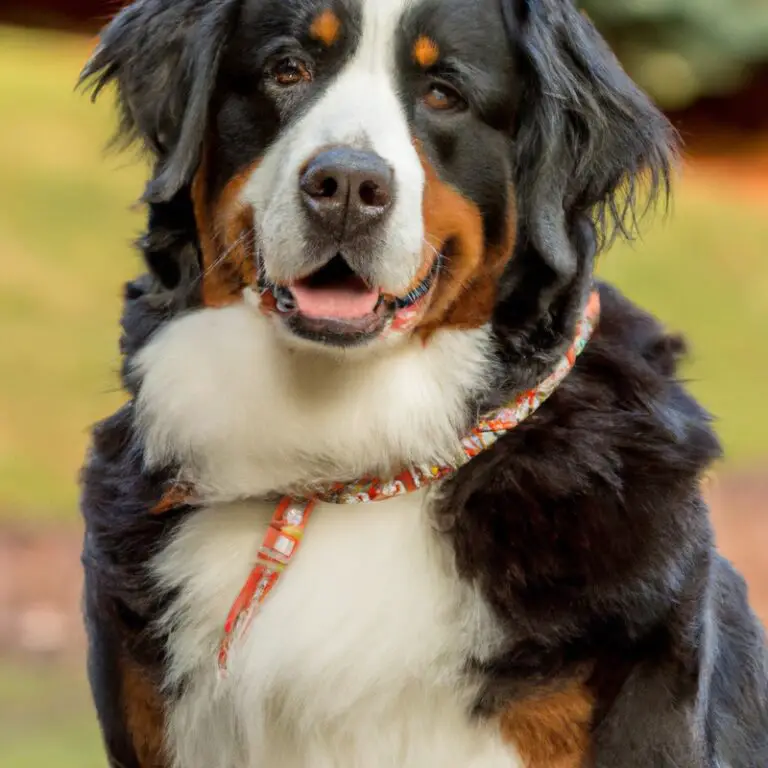Can Bernese Mountain Dogs Be Reliable Off-Leash?
Key Takeaways:
- Training plays a crucial role in determining if a Bernese Mountain Dog can be reliable off-leash.
- Bernese Mountain Dogs have a tendency to wander and may struggle with staying close off-leash.
- Consistent recall training starting from an early age can improve the off-leash reliability of Bernese Mountain Dogs.
- Always consider individual temperament and instincts when deciding if a Bernese Mountain Dog can be trusted off-leash.
Are you a proud owner of a Bernese Mountain Dog, or are you considering getting one?
If so, you might be wondering whether these gentle giants can be trusted off-leash.
As an experienced dog trainer and enthusiast, I can tell you that the answer is not as straightforward as you might think.
Bernese Mountain Dogs are known for their friendly and affectionate nature, but their size and strong prey drive can pose challenges when it comes to off-leash reliability.
In this article, we will explore the characteristics and temperament of Bernese Mountain Dogs, the factors that affect off-leash reliability, and provide you with valuable tips and insights on how to train them to be reliable off-leash.
So, if you’ve ever dreamed of having your Bernese Mountain Dog frolicking freely in the park, stay tuned!
| Pros | Cons | |
| Size | Large and sturdy dogs that can be easily seen in open spaces | Their size can be intimidating to some people or smaller animals |
| Temperament | Generally friendly and sociable | Can be stubborn or independent-minded |
| Training | With proper training, they can be trustworthy off-leash | Require consistent and firm training |
| Reliability | Some Bernese Mountain Dogs can be reliable off-leash with consistent training and socialization | Not all Bernese Mountain Dogs have the same off-leash reliability |
| Environment | May be more reliable off-leash in rural or less crowded areas | Busy or urban environments may pose more challenges for off-leash reliability |
Can Bernese Mountain Dogs be reliable off-leash?
Understanding Bernese Mountain Dogs:
Understanding Bernese Mountain Dogs: Bernese Mountain Dogs are large, gentle, and friendly dogs that make great family pets. They have a calm and loyal temperament, but they can also be a bit stubborn at times.
It’s important to socialize them from a young age to ensure they are comfortable with other dogs and people.
They thrive in a loving and active household, but they also have a tendency to be a bit lazy. Regular exercise and mental stimulation are key to keeping them happy and healthy.
Keep in mind that they have a thick double coat, so they require regular grooming to prevent matting and keep their coat looking its best.
Overall, Bernese Mountain Dogs are wonderful companions if you’re willing to invest time and effort into their care.

Characteristics and Temperament of Bernese Mountain Dogs
Bernese Mountain Dogs have a gentle and friendly nature, making them great family pets. They are known for their loyalty and love for their owners.
These dogs are intelligent and easy to train, but they can be a bit stubborn at times.
They have a calm demeanor and get along well with other animals and children. However, they can be prone to separation anxiety and may not do well if left alone for long periods.
With proper training and socialization, Bernese Mountain Dogs can become reliable off-leash companions.

Exercise Needs of Bernese Mountain Dogs
Exercise is vital for Bernese Mountain Dogs to maintain their physical and mental well-being.
These dogs have moderate exercise needs, requiring around 30 to 60 minutes of daily activity.
Engaging in activities like brisk walks, hiking, and playing fetch can help keep them healthy and happy.
It’s essential to balance their exercise with their age, health, and individual needs.
Providing regular exercise not only helps prevent obesity but also helps strengthen their muscles and joints, promoting overall fitness.

Training and Socialization of Bernese Mountain Dogs
Training and socialization are essential for Bernese Mountain Dogs. They are intelligent and eager to please, making them trainable.
Start obedience training early, using positive reinforcement methods.
Socialize them with people, other dogs, and different environments to prevent fear or aggression. Consistency and patience are key, as they can be stubborn at times.
Gradually increase their exposure to new experiences and reinforce good behavior.
Bond with your Bernese Mountain Dog through training and socialization to build a trusting relationship.
Factors Affecting Off-Leash Reliability:
Factors affecting off-leash reliability include a dog’s training, temperament, distractions in the environment, and the level of trust between the dog and the owner. A well-trained and obedient dog is more likely to be reliable off-leash.
A calm and focused temperament also plays a role.
Environmental distractions can make it harder for a dog to stay focused on the owner. Finally, a strong bond and trust between the dog and owner are crucial for off-leash reliability.
Breed Instincts and Prey Drive
Breed instincts and prey drive play a significant role in determining a Bernese Mountain Dog’s reliability off-leash.
These dogs were originally bred for working purposes, such as pulling carts and herding livestock.
As a result, they have strong instincts to chase and explore.
Their prey drive can be triggered by small animals, making it challenging to keep them focused and obedient when off-leash.
It is crucial to provide proper training and socialization from an early age to help manage their instincts and ensure they can be trusted off-leash.
Individual Personality and Training History
Individual Personality and Training History play a significant role in determining whether a Bernese Mountain Dog can be reliable off-leash. Some dogs naturally have a strong recall instinct and are more inclined to stay close to their owners without a leash.
Others may have a more independent or stubborn personality, making off-leash reliability more challenging.
Additionally, a dog’s training history is crucial. Consistent, positive reinforcement training from a young age can greatly improve their off-leash reliability.
It’s also important to take into account any previous negative experiences or traumas that may affect their behavior.
Age and Energy Level of the Dog
Age and Energy Level of the Dog: The age and energy level of your Bernese Mountain Dog play a crucial role in their off-leash reliability. Younger dogs tend to have higher energy levels and a stronger desire to explore, making them more challenging to trust off-leash.
As they mature and their energy levels decrease, they may become more reliable.
However, every dog is unique, so it’s important to assess their individual temperament, training, and recall skills before allowing them off-leash. Regular exercise, mental stimulation, and consistent training can help increase their off-leash reliability over time.
Tips for Training Bernese Mountain Dogs to be Reliable Off-Leash:
Training Bernese Mountain Dogs to be reliable off-leash can be challenging but not impossible.
Here are some tips:
- Start with basic obedience training: Teach your Bernese Mountain Dog commands like “sit,” “stay,” and “come” using positive reinforcement techniques.
- Gradually introduce off-leash training in a safe, enclosed area: Begin by letting your dog off-leash in a secure space where they can’t run away. Reward and praise them for coming back to you.
- Use long training leads: Use a long, lightweight leash to gradually increase your dog’s freedom while maintaining control. This allows you to reinforce commands and recall if needed.
- Practice recall regularly: Make recall a fun and rewarding experience by using treats, toys, and enthusiastic praise. Practice in different environments to generalize the behavior.
- Be patient and consistent: Training takes time and repetition. Consistently reinforce good behavior, and address any challenges or distractions along the way.
- Consider professional help: If you’re struggling or want expert guidance, consult a professional dog trainer who specializes in off-leash training.
Remember, every dog is unique.
Some Bernese Mountain Dogs may struggle with recall due to their independent nature, so be prepared for individual variations in training progress.
Start with Basic Obedience Training
Start with basic obedience training to ensure that your Bernese Mountain Dog can be reliable off-leash. Teach them commands like sit, stay, come, and heel using positive reinforcement techniques.
Consistency and patience are key during this training process.
Gradually introduce distractions to increase their focus and response to commands. Practicing in different environments will help solidify their training.
Regular training sessions and continued reinforcement will help your Bernese Mountain Dog become reliable off-leash.
Gradually Introduce Distractions
When training your Bernese Mountain Dog to be reliable off-leash, it’s important to gradually introduce distractions.
Start in a low-distraction environment and slowly increase the level of distractions over time.
This might mean practicing in a quiet backyard, then moving to a park with other dogs, and eventually working around other animals, people, and noisy environments.
By exposing your dog to distractions gradually, you can help them build their focus and obedience skills, making them more reliable off-leash.
Practice Recall Commands in Different Environments
To improve your Bernese Mountain Dog’s off-leash reliability, it’s important to practice recall commands in different environments.
Start in a controlled, familiar space and gradually increase the level of distraction.
Reinforce the recall command with positive rewards and praise.
Practice in different places like parks, streets, or even with other dogs around.
Remember to be patient, consistent, and use a confident tone.
With practice, your Bernese Mountain Dog can become more reliable off-leash in various environments.
Use Positive Reinforcement Techniques
Positive reinforcement techniques are highly effective when training Bernese Mountain Dogs off-leash.
Rewarding desired behaviors such as staying close, responding to commands, and coming when called, helps to strengthen the bond and trust between you and your dog.
Use treats, praise, and play as rewards, and be consistent with your training.
Start in a controlled environment and gradually increase the level of distractions.
Be patient, consistent, and always reward your dog for good behavior.
Choosing the Right Environment for Off-Leash Activities
When it comes to off-leash activities for Bernese Mountain Dogs, choosing the right environment is essential.
Here are some factors to consider:
- Secure and enclosed space: Opt for a fenced area or a designated dog park to ensure your Bernese Mountain Dog cannot run off or get lost.
- Minimal distractions: Look for an environment with fewer distractions such as traffic, other dogs, or crowded areas. This will help keep your dog focused and more responsive to your commands.
- Suitable terrain: Choose an environment with safe and suitable terrain, avoiding rugged or challenging terrains that could potentially harm your dog’s joints or cause injuries.
- Adequate space: Make sure the environment provides enough space for your dog to roam, explore, and burn off energy comfortably.
- Consider the weather: Take into account the weather conditions, especially extreme heat or cold, and choose a time and place that will keep your dog comfortable and safe.
Using Secure Enclosures
Using secure enclosures is a reliable way to keep Bernese Mountain Dogs safe off-leash.
Fenced-in yards or dog parks provide a controlled environment where your dog can freely roam and play without the risk of running off or getting into dangerous situations.
It’s important to ensure that the enclosure is secure and properly maintained to prevent any potential escapes or injuries.
Regularly check for loose or damaged sections and always supervise your dog when they are off-leash.
A secure enclosure offers peace of mind and allows your Bernese Mountain Dog to enjoy some off-leash freedom while staying safe.
Supervising and Monitoring the Dog’s Behavior
Supervising and monitoring your Bernese Mountain Dog’s behavior is essential for off-leash reliability.
Keep a close eye on their actions, paying attention to any signs of distraction or potential problems.
Maintain a clear line of sight and stay aware of their surroundings.
Regularly check in with your dog, using cues and commands to reinforce their training.
Use positive reinforcement to reward good behavior and redirect any undesirable behavior promptly.
Stay attentive and observant while giving your dog the freedom to explore, ensuring their safety and your peace of mind.
Carrying Proper Identification and Microchipping
Carrying proper identification and microchipping are important when it comes to ensuring the safety of your Bernese Mountain Dog. Having an ID tag with your current contact information is crucial if your dog ever gets lost.
Additionally, microchipping provides a permanent form of identification that can greatly increase the chances of being reunited with your dog if they go missing.
Remember to keep your contact information up to date and ensure that your dog’s microchip is registered.
Frequently Asked Questions:
Frequently Asked Questions:
1. Can Bernese Mountain Dogs be trained to walk off-leash?
Yes, Bernese Mountain Dogs can be trained to walk off-leash with consistent training, patience, and positive reinforcement. Start with basic commands such as “come” and gradually build up to more advanced obedience training.
2. How long does it usually take to train a Bernese Mountain Dog to be off-leash?
The time it takes to train a Bernese Mountain Dog to be reliable off-leash can vary. It depends on the individual dog’s temperament, previous training, and the consistency of training.
It can range from a few weeks to several months.
3. Are there any specific challenges in training Bernese Mountain Dogs to be off-leash?
Bernese Mountain Dogs are generally eager to please and intelligent, but they can have a stubborn streak. Consistency and positive reinforcement are key in training them.
It’s important to work on recall, stay, and impulse control exercises to ensure they stay focused and responsive when off-leash.
4. Should I use a long lead or training collar for off-leash training?
Using a long lead or training collar can be helpful during the initial stages of off-leash training. It provides added control while allowing your dog some freedom to roam.
However, it’s important to transition to off-leash training gradually and gradually phase out the need for these tools.
5. How can I ensure my Bernese Mountain Dog’s safety when off-leash?
To ensure your Bernese Mountain Dog’s safety when off-leash, it’s important to choose appropriate environments for off-leash walks. Avoid busy roads or areas with potential hazards.
Use positive reinforcement to encourage your dog to stay close and check in with you regularly.
Regularly reinforce training and practice recall in different environments to strengthen their response. Remember, every dog is unique, and training results may vary.
It’s important to be patient, consistent, and adapt your training methods to suit your specific dog’s needs.
What is the average recall success rate for Bernese Mountain Dogs?
The average recall success rate for Bernese Mountain Dogs is moderate.
While they are generally obedient and trainable, their independent nature and tendency to be easily distracted can make off-leash recall challenging.
Consistent training, positive reinforcement, and using high-value rewards can improve their response.
However, it’s important to remember that each dog is unique, so individual results may vary.
It’s always a good idea to assess your dog’s recall abilities in a controlled and safe environment before trusting them off-leash.
Can Bernese Mountain Dogs be trusted off-leash in public places?
Being off-leash in public places can be a challenge for Bernese Mountain Dogs. While some individuals may be trustworthy off-leash, it largely depends on their training and temperament.
However, due to their independent nature and high prey drive, it is recommended to keep them on a leash in public to ensure their safety and the safety of others.
It’s always best to consult with a professional dog trainer for guidance on off-leash training for Bernese Mountain Dogs.
Are Bernese Mountain Dogs prone to running away?
Bernese Mountain Dogs are generally not prone to running away.
They are known for their friendly and gentle nature, which makes them more inclined to stick close to their owners.
However, like any dog breed, individual personalities may vary.
It’s important to provide proper training, socialization, and a secure environment to minimize the chances of a Bernese Mountain Dog running away.
Keeping them on a leash or within a fenced area is advisable to ensure their safety.
Is spaying/neutering important for off-leash reliability?
Spaying/neutering can have a positive impact on a dog’s off-leash reliability.
It can reduce hormone-driven behaviors, such as roaming, marking, or aggression, which may interfere with training and obedience.
Additionally, it helps prevent unwanted pregnancies and reduces the risk of certain health issues.
However, it’s important to note that spaying/neutering alone does not guarantee off-leash reliability.
Consistent training, socialization, and reinforcement are equally essential for a well-behaved, off-leash dog.
Final Verdict
While Bernese Mountain Dogs can be trained to be reliable off-leash, it is important to understand their characteristics, exercise needs, and training history.
Factors such as breed instincts, individual personality, and age can affect their off-leash reliability.
However, with proper training, starting with basic obedience and gradually introducing distractions, Bernese Mountain Dogs can excel off-leash.
It is essential to ensure safety by choosing the right environment, using secure enclosures, and supervising their behavior.
With patience, consistency, and positive reinforcement, Bernese Mountain Dogs can become trustworthy off-leash companions.







